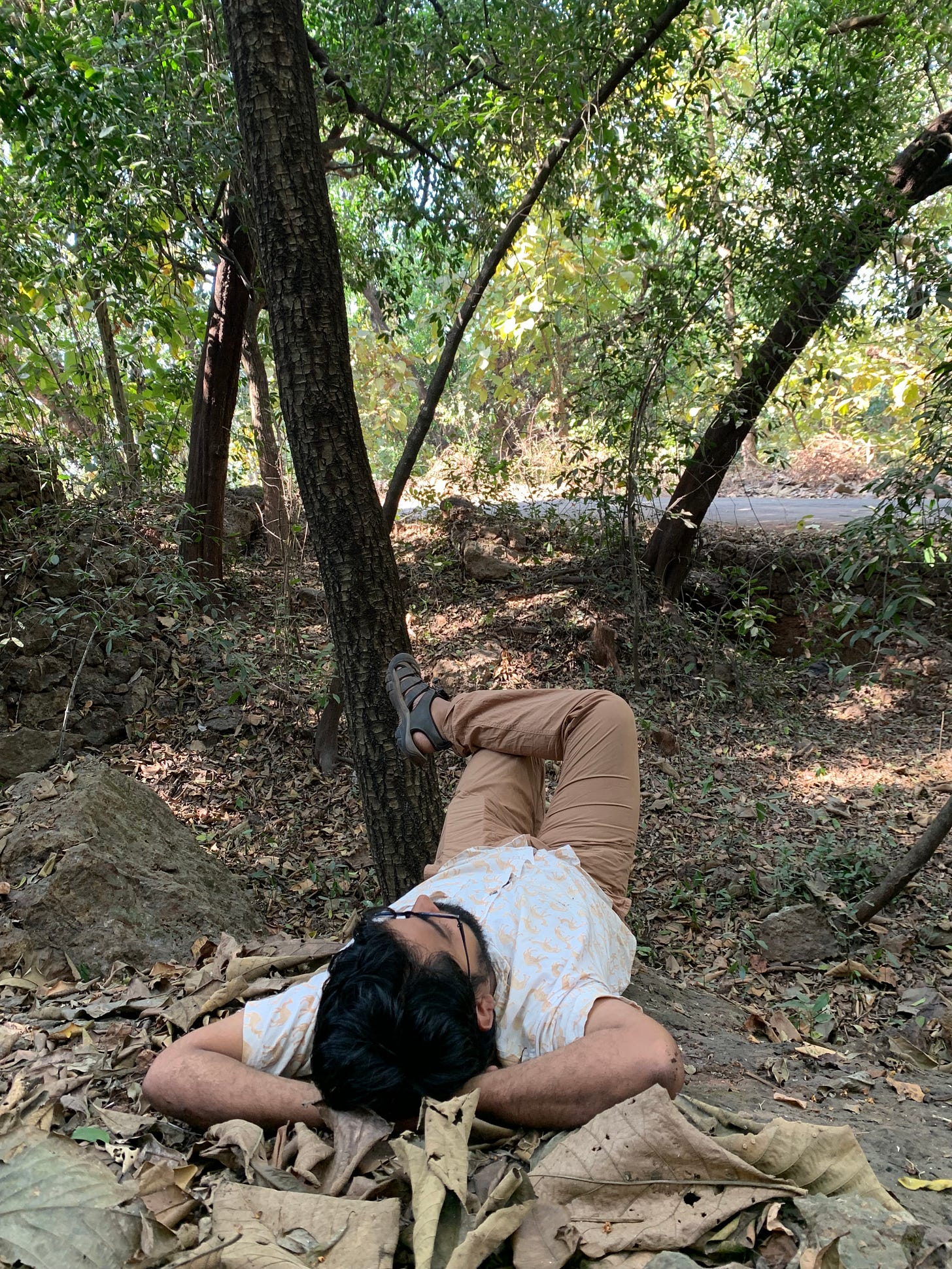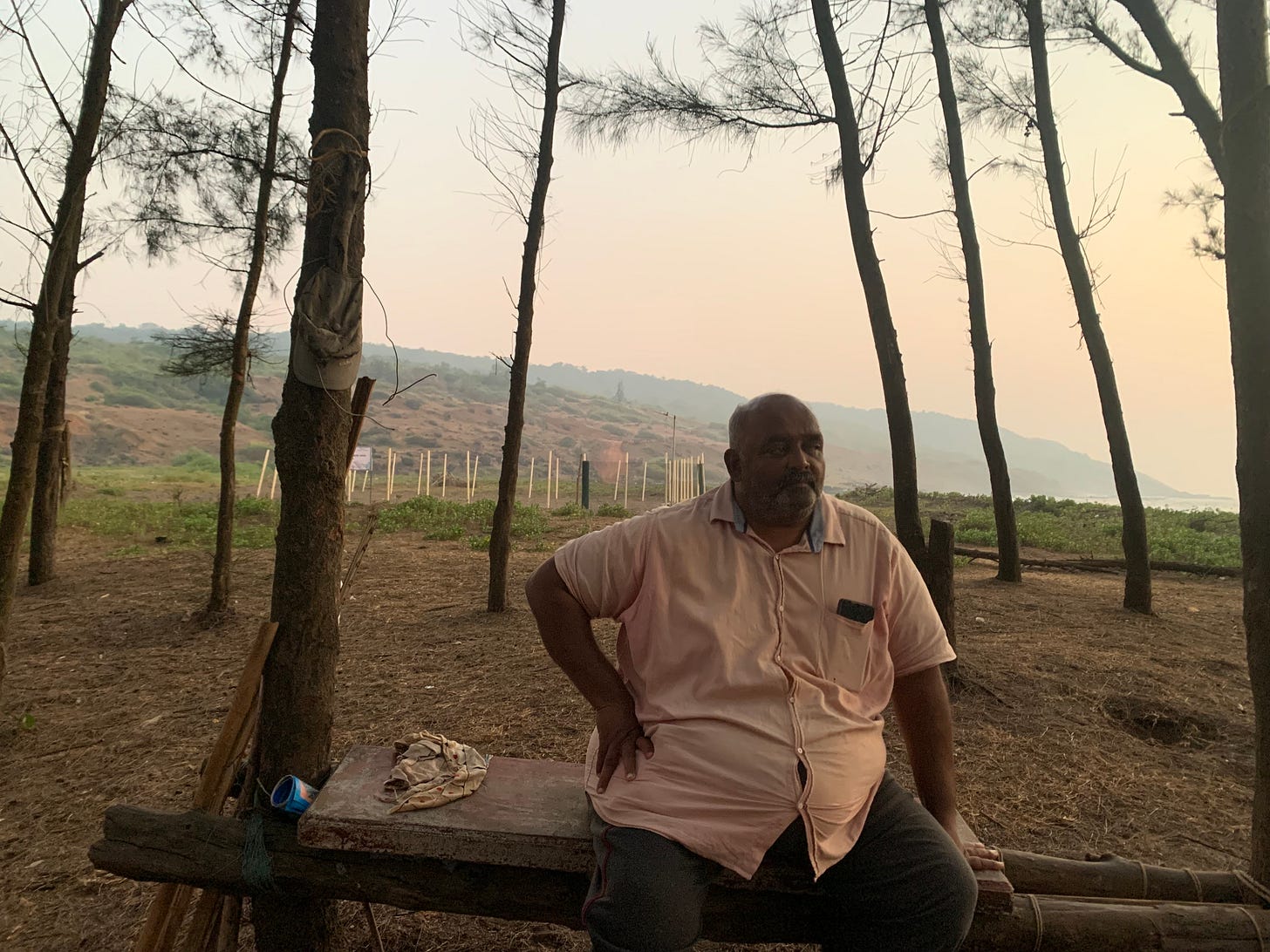In the afternoon Yash and I sat by the roadside. Yash has come to walk with me for two days. In Neral, near Matheran, he works with the Adivasi tribes to help keep alive their culture and revive their disappearing practices. Maybe it is living beside these people, who live on the brink of poverty by the modern standards and yet are content in their daily life, has brought this calm within him.
I have developed a runny nose since this morning. Rest is must. Searching for a place, I finally found an opening in a mango farm. A nepali man was sitting nearby. He made noises to push the monkeys away from the farm. A simple but sturdy tree house housed all his belongings. A tarpolin covered the top bits and grass was laid on sticks which acted as cushioning for his back. A compartment underneath his bed stored all sorts of vegetables.
I have heard this many times when I visited Nepal, “Dal bhaat power 24 hour.” It is true. His dal bhaat was ready for serving.
This is my opinion, that Nepali people live truly happy lives. They are extremely well kept. They make their own food and they eat healthy. They come here with their family. Their kids study in local schools. They build their tree houses in the farm where they work with total intent and thus they are sought after by every mango farm owners. It is true that mango cannot be cultivated without the help of Nepali workforce. Each year more Nepalis, living on the border areas between Indian and Nepal find employment within the mango and fishing sector. I have seen them constructing boats, picking mangoes, guarding trees and building houses. What is important in all this is, they are connected with nature. They can sit in quiet for hours— a tradition that we have lost given our fast paced lives.
I moved ahead and offered an apple, hoping that he would let me stay in the farm. He smiled and accepted it. Some bonds are human.
Yash and I slept under the shade of the mango, forgetting the madness of the outside world. In that moment, my world consisted of only three people, Yash, me and our Nepali uncle. My illness brought me to an instant sleep.
In the evening, we were asked to meet Pradeep Dingankar, a local of Gavkhadi who helps in the conservation of Olive Ridley turtles. Pradeep, against all odds, succeeded in making the villagers realise that turtle conservation was necessary.
When we met, his physique made me question if he would be really doing this work, but I was wrong. Even after having an illness that swelled his right leg, he hasn’t budged a bit. Two operations have still not stopped him or pushed him away from his conservation efforts.
“I was laughed at when I started this work,” he spoke and sat on the wooden plank next to the turtle conservation area.
“Some even came to fight with me. ‘You are not letting us eat turtle eggs,’ they’d say. Foxes would sit next to the turtles, waiting for the turtles to move away, so that they would feast on the eggs. We had to wake up at 4 in the morning, sleep by the beach to keep an eye out on the turtles. After 7-8 years of constant efforts, the villagers have developed an understanding. The forest office helped us to start with, but now they are only interested in numbers. ‘How many turtles laid eggs? How many of them hatched?’ They are more interested in running paper horses than actually helping us in conservation efforts. Every year, during the hatching season, the high ranking officers give us a visit. Having no thought of our conversation efforts, they are always interested in picking the baskets and leaving the turtles towards the beach. They bring their families and friends to do the same. Who gives them this right? The mama turtles lay eggs on the shore, hoping that their kids walk the surface to reach the water, which gives them strength. These people don’t understand any of this. They are interested in pictures and they use their power to mend and bend every single law. Don’t they see all this the way we do?” I could sense the grief in his voice. Many moons have passed, where he has watched the turtles come to the shore at 4 am. Conserving their eggs is no east feat!
“Even the village doesn’t understand our efforts. When our task was recognised, the village started receiving funds under the bio-diversity hotspot quota. The shore came under A-grade, which amped up the government funds. This was to help the conservation efforts, but what did the village do? Install lights (they were even thinking of halogen) on the shoreline. The turtles run away when they see such lights. It is obvious that some of this fund too would be used up by the likes of local politicians, because the funds had dried up till they reached us. Sometimes I am confused, I see this sea, these rocks and these turtles in awe. I sit in silence and observe this wondrous happening. I think to myself, have I gone mad? Am I the only person who sees this for what it is? Can we not sway silently with the wind while it brings the waves on and off the shore? Can we not let nature be as it is rather than encroaching it to make personal gains?
I lack funding, yet I can’t stop this. The turtles have grown in numbers and they expect a safe space on this shoreline. We can’t give them false hopes. ” we sat there in quiet while he spoke. The stars had come up, the suru trees were swaying with the wind. We were simply three humans sitting by the beach, guarding turtle eggs.
If the turtles have found hope in humanity, how can we feel otherwise?
Thank you for the help provided so far and for being a part of this walk! I now have a team assisting me and if financial support can be provided to keep them going, then please do so. here’s the link
For Indians who want to support'/contribute, here is the UPI payment number GPay or PhonePe- 8983726737
The idea of this walk is to highlight the issues, spread an ecological conscience within the people, listen to them and bring them together to see if we can bring about a change that can move towards a future that aids people rather than pushes them away from their homeland.
If you can help me by contributing for this walk, then please do, I could start a kickstarter or manage crowdfunding through some other website, but none of those options are available to me here in India. So, I will be dependant on your donations. You can contribute through paypal - here’s the link. I will send out a personalised postcard if the donations are above $30 and if it’s above $100 then whatever comes out of this walk - a book, a documentary or anything else - you will be the first ones to receive it.








Shalom, Ashutoshi Joshi (=Joshua?)
I wonder if you might consider incorporating a map of your steps. Nothing fancy, no great detail unless you think it worthwhile to add to your writing, simply to give a visual context.